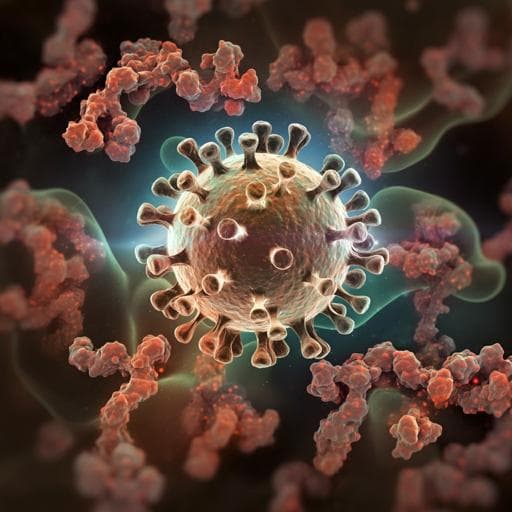
Medicine and Health
Robust induction of functional humoral response by a plant-derived Coronavirus-like particle vaccine candidate for COVID-19
P. Kaplonek, D. Cizmeci, et al.
Discover how a novel plant-derived Coronavirus-like particle vaccine candidate, with the AS03 adjuvant, elicits a remarkable and lasting immune response against SARS-CoV-2. Conducted by leading researchers including Paulina Kaplonek and Galit Alter, this study reveals the vaccine's ability to sustain critical antibody functions even as neutralizing titers decline.
~3 min • Beginner • English
Introduction
SARS-CoV-2, the causative agent of Coronavirus Disease-19 (COVID-19), has infected nearly 500 million people globally and caused more than 5 million deaths. The spread, unpredictable nature of disease severity, and limitations in therapeutics have collectively driven the need for vaccines as an essential tool to fight this virus. To address this need, several new vaccine platforms, including nucleic acid and vector-based vaccines, have emerged. Despite their success, global availability, emergence of variants of concern (VOCs), and waning immunity leave large populations vulnerable, underscoring the need for alternate vaccines that can be deployed globally to inform booster strategies.
Neutralizing antibodies have been proposed as correlates of immunity, but accumulating data indicate strong associations between binding antibodies and vaccine efficacy across platforms. Neutralizing antibodies wane rapidly over time, whereas binding antibodies are more durable, suggesting non-neutralizing functions contribute to long-term protection. Protection against severe illness has been relatively preserved despite losses in neutralization to VOCs, implicating Fc-effector functions in protection in severe disease, monoclonal therapy in animal models, and vaccine-mediated protection in non-human primates. Thus, while high neutralizing titers can block transmission, durable binding antibody functions likely attenuate disease over time.
The plant-made Coronavirus-like particle (CoVLP) vaccine, recently licensed in Canada by Medicago Inc., showed efficacy against symptomatic COVID-19 of 69.5% and 78.8% against moderate-to-severe disease. The vaccine displays trimers of recombinant SARS-CoV-2 Spike embedded in a lipid bilayer VLP that forms in Nicotiana benthamiana and elicits cellular and humoral responses. Given the importance of antigen size, stoichiometry, and arrangement, delivery of Spike in a viral-like conformation may promote optimized responses. Whether CoVLP induces durable, functional non-neutralizing antibodies and whether these are enhanced by AS03 adjuvant remained unclear.
Here, systems serology was applied to Phase 1 trial samples where volunteers received two doses of CoVLP (3.75 µg, 7.5 µg, 15 µg) with or without AS03, 21 days apart. SARS-CoV-2 WT and VOC-specific antibody isotypes/subclasses, FcγR-binding profiles, and Fc-effector functions were assessed at peak immunogenicity (Day 42) and at six months post-peak (Day 201). While AS03 had minimal impact on cellular responses, it markedly improved humoral responses, including neutralizing and binding antibodies characterized by robust FcγR binding and effector functions. Some non-neutralizing functions declined over time, but FcγR2A-binding antibodies with high opsonophagocytic activity remained detectable over six months, suggesting persistence of antibody effector functions following CoVLP-AS03 vaccination that may contribute to long-term protection against COVID-19.
Literature Review
The paper situates its research within evidence that: (1) neutralizing antibody titers correlate with protection but wane over time; (2) binding antibodies are more durable and correlate with vaccine efficacy; (3) VOCs can escape neutralization while severe disease protection is preserved, implicating other immune mechanisms; (4) Fc-effector functions are associated with survival in severe COVID-19, are critical for therapeutic monoclonal efficacy in models, and contribute to vaccine-mediated protection in non-human primates. The authors also review the advantages of virus-like particle (VLP) vaccines (e.g., HPV and HBV), where antigen arraying enhances BCR cross-linking and durable responses, and describe the enhancing role of adjuvants like AS03 in magnitude, breadth, and durability of responses across pathogens. They reference data showing mRNA and inactivated vaccine platforms maintain Fc-effector functions across VOCs, supporting investigation of CoVLP+AS03 for durable functional humoral immunity.
Methodology
Study design: Phase 1 randomized controlled trial (NCT04450004) at two sites in Quebec City and Montreal. Healthy, seronegative adults 18–55 years were randomized 1:1 to receive two doses of CoVLP at 3.75, 7.5, or 15 µg with or without AS03, 21 days apart. Blinded personnel collected safety and immunogenicity data. Serum was collected at Day 42 (21 days after dose 2) and Day 201 (six months post-second dose). Groups analyzed: CoVLP+AS03 (n=17) and CoVLP (n=16). No formal power calculations were performed.
Vaccine production: Full-length SARS-CoV-2 Spike (strain hCoV-19/USA/CA2/2020; nucleotides 21,563–25,384, GISAID EPI_ISL_406036) was transiently expressed in Nicotiana benthamiana via Agrobacterium tumefaciens infiltration. Spike modifications: R667G, R668S, R670S at S1/S2 to increase stability; K971P, V972P for pre-fusion stabilization. Signal peptide replaced with alfalfa protein disulfide isomerase; transmembrane/cytoplasmic tail replaced with influenza H5 A/Indonesia/5/2005 TM/CT to enhance VLP assembly/budding. Expression driven by double 35S promoter with proprietary UTRs; TBSV P19 suppressor co-expressed. VLPs were harvested 5–6 days post-infiltration, extracted, and purified via filtration and chromatography.
Adjuvant/formulation: AS03 is an oil-in-water emulsion containing DL-α-tocopherol (11.69 mg per dose) and squalene (10.86 mg per dose). For administration, CoVLP and AS03 were gently mixed 1:1 (v:v). Final doses: 3.75, 7.5, or 15 µg CoVLP + 0.25 mL AS03 in 0.5 mL injection volume; unadjuvanted formulations were 0.25 mL. Two IM injections, 21 days apart.
Luminex profiling: Multiplexed assays quantified isotypes/subclasses (IgG1, IgG3, IgA1, IgM) and FcγR binding (FcγR2a, FcγR3a; high-affinity FcγR excluded). SARS-CoV-2 antigens (WT Spike, RBD, S1, S2, NTD; VOC Spikes: Alpha, Beta, Delta, Omicron) were carbodiimide-NHS-coupled to magnetic beads. Sample dilutions: 1:500 for IgG1 and low-affinity FcγR readouts; 1:100 for others. Detection used PE-conjugated secondary antibodies or PE-labeled FcγRs. Readout: PE MFI on Intellicyt iQue; analyses in ForeCyt. Assay QC confirmed no day 0 reactivity.
Effector functional assays: ADCP and ADNP used Neutravidin beads coupled to Spike; immune complexes formed with pooled diluted serum (1:100) for 2 h at 37 °C. ADCP: THP-1 cells (1.25×10^5/mL) incubated ~18 h; ADNP: RBC-lysed whole blood (5×10^5 cells/mL) for 1 h; neutrophils identified by CD66b+ staining. ADCD: spike-coupled beads incubated with serum (1:10) 2 h; guinea pig complement added 30 min; C3 deposition detected by fluorescein anti-C3. Readouts acquired on iQue. Phagocytosis scores: %positive × MFI; ADCD reported as median C3 deposition. ADNK: Plates coated with Spike (2 µg/mL), blocked with 5% BSA; immune complexes with serum (1:25) 2 h. Primary NK cells (CD3−CD16+CD56+) from healthy donors were incubated 5 h with degranulation marker (CD107a) and intracellular cytokines (IFN-γ, MIP-1β) assessed by flow cytometry.
Glycan analysis of Spike-specific IgG Fc: Spike-coated carboxy beads captured antigen-specific antibodies from serum (25 µL serum + 25 µL beads, overnight 4 °C). Bound IgG was IdeZ-digested; released glycans labeled with APTS (Glycan Assure Kit) and analyzed by capillary electrophoresis (Applied Biosystems 3500xL). Glycoforms were assigned using standards; relative frequencies computed as peak area fractions.
Statistics and modeling: Data analyzed in R 4.0.2. Group comparisons: Mann–Whitney U test or Wilcoxon signed-rank with Benjamini–Hochberg correction. Luminex data log-transformed, features scaled/centered; dots represent gMFI of replicates. Feature selection via LASSO (glmnet), repeated 100× per training set in 10-fold CV; features selected ≥90/100 retained. Classification via PLS-DA (ropls); VIP scores used for ranking, first two latent variables visualized. Co-correlate networks used Spearman correlations with BH correction (|rho| ≥ 0.7, adjusted p < 0.01), visualized with R package network.
Key Findings
- Cohort and time points: CoVLP+AS03 (n=17) and CoVLP (n=16) assessed at Day 42 (peak) and Day 201 (~6 months).
- Isotype/subclass titers: AS03 significantly boosted WT Spike-specific IgG1, IgG3, IgM, and IgA at Day 42 across doses (3.75, 7.5, 15 µg) with minimal dose-dependent differences; titers declined by Day 201 but IgG1 remained detectable. PCA showed clear separation between adjuvanted and non-adjuvanted profiles (PC1=67.4% variance), with doses largely indistinguishable.
- FcγR binding and function: AS03 markedly increased FcγR binding (notably RBD- and S1-specific FcγR-binding) and effector functions (ADCD, ADCP, ADNP, ADNK) at Day 42. At Day 201, overall responses contracted but remained higher in adjuvanted recipients, with selective persistence of FcγR2A binding and opsonophagocytic activity (ADCP) across Spike, S1, and S2. Network analyses showed strong correlations among features at Day 42; by Day 201, correlations decreased but remained strong for phagocytic antibodies, FcγR2A/FcγR2B binding, and IgG3.
- Multivariate discrimination: LASSO/PLS-DA identified discriminant features enriched in CoVLP+AS03 at both time points: expanded RBD/S1 FcγR-binding, higher S1/Spike isotype/subclasses, enhanced complement deposition, neutrophil and monocyte phagocytosis, and some S2-specific IgG3 and FcγR binding.
- Functional durability: All measured functions (ADCD, ADCP, ADNP, ADNK) remained above detection at 6 months; ADCD and ADNP declined more sharply, whereas ADCP and ADNK (especially MIP-1β secretion) remained relatively high across adjuvanted individuals.
- Glycosylation: In CoVLP+AS03 recipients, Spike-specific IgG displayed significantly lower fucosylation at Day 201 vs Day 42, with trends toward higher sialylation and bisection, potentially modulating Fc-effector interactions.
- Cross-VOC responses: CoVLP+AS03 induced robust IgG1/IgG3 and FcγR2A/2B/3A binding to Alpha, Beta, and Delta at Day 42, with declines by Day 201 but persistent FcγR2A binding across all tested VOCs (Alpha, Beta, Delta, Omicron). Against Omicron, IgG3 responses were triggered but lacked effective FcγR binding. Overall, FcγR2A-binding titers persisted at Day 201 across VOCs, suggesting sustained opsonophagocytic potential despite waning neutralization.
Discussion
Delivering Spike on plant-derived VLPs provides a multivalent, native-like antigen display that can promote B-cell receptor clustering, enhancing the magnitude, durability, and quality of humoral responses. While unadjuvanted CoVLP elicited modest antibody responses at tested doses, AS03 substantially increased both magnitude and durability, notably enhancing FcγR binding and opsonophagocytic and NK cell-activating functions that persisted for at least six months. These findings align with prior successes of VLP vaccines and the known capacity of AS03 to augment antigen uptake, T cell priming, and multifunctional antibody responses.
The persistence of Fc-effector functions, particularly FcγR2A-mediated opsonophagocytosis (ADCP), across WT and multiple VOCs (including Alpha, Beta, Delta, and to a degree Omicron) suggests that non-neutralizing antibody functions may serve as a durable layer of protection against severe disease, even as neutralization wanes or is evaded by variants. The observed glycan shifts (reduced fucosylation) may further potentiate Fc-mediated activities. Given that CoVLP+AS03 also elicits CD4 T cell responses that are cross-reactive and durable, functional antibodies likely provide an early barrier while T cell responses mediate viral control, together contributing to sustained protection across VOCs.
Conclusion
Two doses of the plant-derived CoVLP vaccine adjuvanted with AS03 elicited robust, multifunctional, and durable humoral immunity. Despite waning titers, FcγR2A-binding and opsonophagocytic functions (notably ADCP) persisted for at least six months and extended across multiple SARS-CoV-2 variants of concern. These data support CoVLP+AS03 as a promising, globally deployable addition to the COVID-19 vaccine armamentarium. Future work should evaluate efficacy and immunogenicity in larger and more diverse populations, assess durability beyond six months, and dissect domain-specific and epitope-specific functional antibody responses across emerging VOCs.
Limitations
- Small sample size from a Phase 1 safety-focused trial (CoVLP+AS03 n=17; CoVLP n=16).
- Participants were healthy adults aged 18–55; findings may not generalize to older adults or individuals with comorbidities.
- Limited sample volume precluded detailed functional mapping to specific Spike regions and across VOC antigens.
- Neutralization data discussed contextually; the study emphasized binding and Fc-mediated functions rather than comprehensive neutralization breadth/kinetics.
Related Publications
Explore these studies to deepen your understanding of the subject.







